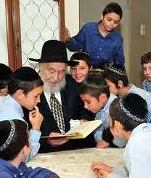The reign of bullying by the Hebrew Yated Ne'eman comes to an end as Rav Steinman took control by having R' Shimmy Glick buy the newspaper and fire the staff.
kikarhashabat
במשך עשרות שנים, הצליח עיתון אחד, מגזרי, להלך אימים על רבותיו, ולא רק: מישהו מכיר רב, ראש-ישיבה, או אדמו"ר מפורסם שלא חטף אי-פעם "עקיצה" מהיומון "יתד נאמן"? האם למישהו השם "יתד נאמן" משדר משהו חיובי בכלל?
עורכי העיתון החצופים הצליחו פעם אחר פעם, בשחצנות שאין לה אח ורע
בעולם החרדי, ללעוג לרבותיהם, לרבנים מפורסמים ולאדמו"רים שכל חייהם הוקדשו לפעילות חסד וקדושה ברחבי הארץ והעולם
אלה שיחקו בתוארים של רבנים, השפילו ורוממו, והכל על-פי מצב הרוח באותו הבוקר.
לפני כשבועיים, בצעד היסטורי, הצליח מרן ראש-הישיבה הגראי"ל שטיינמן להחזיר את המושכות לגדולי ישראל. ההמשך היה אמש, כפי שדווח בהרחבה ב'
כיכר השבת': גורמים שונים, מההנהלה הישנה של העיתון, ניסו בכל דרך למנוע את פרסום המכתב של מרן הגר"ח קנייבסקי
[...]
נסיים בציטוט ממכתבו של הרב קנייבסקי, המתפרסם היום ב"יתד": "והנה חובה לכל לציית לכל מוצא פיו של מרן שליט"א והזהרו בגחלתן, ובזה מקיימים מ"ע ועשית ככל אשר יורוך, וכל העוזרים והמסייעים בהנהלת העיתון החדשה בראשות הר"ר שמעון גליק שליט"א יתברכו בכל טוב סלה. חיים קניבסקי"..
.








